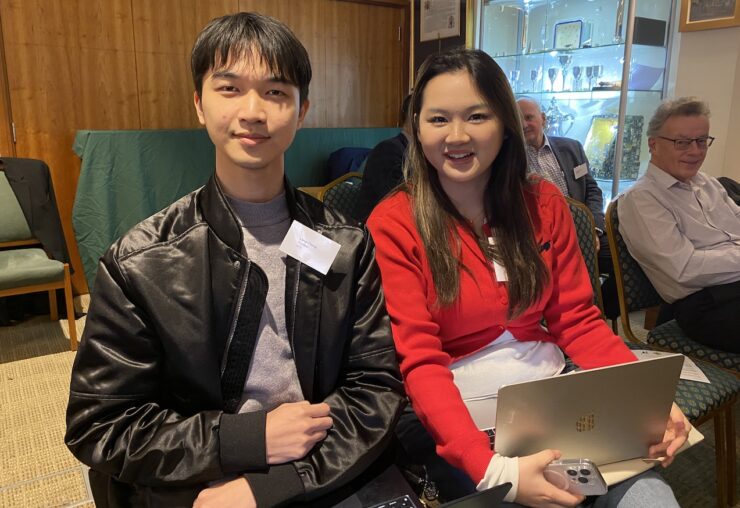
Ziyu Wang and Lang Cheng are undergraduate students studying at UCL’s Faculty of Education and Society in London. They joined Archives of IT (AIT) on placement in January as part of our Work Experience Programme 2025.
This programme is part of AIT’s goal to offer placement opportunities and encourage students to study the history and current role of the IT industry through our archive, research and events.
The students joined the AIT team in the lead-up to the 2025 Forum on Norms for the Digital Age from Students to States, which took place in London on 28 January. This enabled them to gain an understanding of the processes and importance of such an event as well as AIT’s work, both as an archive and in education.
The students spent time familiarising themselves with AIT’s mission and website, participated in meetings with the AIT team, and attended the Forum where they mixed with speakers and attendees.
From this they have now written two articles that draw on Forum discussions on professionalism and social media that give a unique Chinese perspective.
Professionalism
Nowadays, in the field of technology, the term ‘Professionalism’ goes beyond mere technical proficiency — it embodies a promise of quality, accountability, and responsibility. It demands rigorous standards in product development, customer service, and user experience, requiring meticulous testing and careful review at every stage. Yet, the persistent Digital Divide subtly encourages behaviours that undermine this essential professionalism.
In China, amid fierce market competition, many companies adopt a strategy known as ‘launch first, fix later’, prioritising rapid market penetration over product quality. For instance, a prominent short-video platform quickly rolled out a simplified version designed explicitly to capture lower-tier markets, using frequent updates supposedly aimed at continuous improvement. Unfortunately, these updates often fail to resolve underlying issues. High-end devices may enjoy seamless user interactions, while users with lower-end devices endure persistent glitches and frequent app crashes. Such practices, superficially justified as ‘agile development’, reveal a critical lack of professionalism. Authentic agile methodologies prioritise comprehensive user experiences and stability rather than discriminating against less digitally proficient users or those with lower-quality devices.
Deficiencies in quality assurance testing
Behind the frequent updates of short-video platforms lie not technological breakthroughs, but obvious deficiencies in quality assurance testing and product management. Companies, driven by short-term growth ambitions, often neglect the experiences of lower-end users. To retain these frustrated users, platforms resort to financial incentives, such as cash rewards earned through daily tasks — simply watching short videos for a set duration. These incentives effectively keep users tied to platforms despite poor user experiences. Such practices vividly illustrate how gaps in digital literacy combined with financial incentives encourage users to tolerate otherwise unacceptable technical flaws.
Coupon night incident
If such unprofessional practices become widespread, the consequences could be far more severe than anticipated. The infamous 2019 ‘Coupon Night’ incident involving a major Chinese e-commerce platform exemplifies this risk. Due to a technical loophole, users were able to claim unlimited 100-yuan (£10) discount coupons overnight, resulting in enormous financial losses. A seemingly minor oversight — failing to limit coupon redemptions — resulted in massive financial losses stemming from coding errors and inadequate risk management. Even more alarming are the broader consequences of such technical negligence.
A prominent ride-hailing app, driven by aggressive market expansion, neglected essential national security compliance procedures, ultimately resulting in a staggering loss of approximately 300 billion yuan (£30bn) in market value. These cases clearly demonstrate how minor oversights in the digital age can quickly escalate into catastrophic consequences.
Implications of unprofessionalism
Overall, the lack of professionalism — in marketing strategies, customer service practices, and the genuine valuation of user experiences — has implications far beyond technical errors. It profoundly impacts corporate reputations, erodes consumer trust, and threatens industry sustainability. The Digital Divide allows certain user groups to accept subpar products due to limited digital literacy, while companies chasing rapid growth increasingly compromise professional standards and ethical responsibilities. If these practices persist, continuously undermining established norms, industry-wide standards will inevitably decline. Market-driven compromises could become the new norm, risking the permanent loss of professionalism as a fundamental corporate value.
Cancel Culture
In the digital age, everyone seems to hold a powerful tool — the ability to pass moral judgment at the click of a button. Without needing formal legal proceedings, social media storms alone can swiftly deliver punishing social consequences to any individual or group. This phenomenon, widely known as ‘Cancel Culture’, first emerged in the West, but as it spread into China, it evolved into a uniquely Chinese form — a blurred fusion between informal public punishment and formal official sanction.
Link to internet censorship
In China, Cancel Culture is deeply intertwined with official internet censorship, creating ambiguity between informal social backlash and official punishment. Chinese social media platforms, especially short-video services, operate under extremely tight regulatory frameworks. Strict censorship significantly limits free expression online, forcing users and content creators into a world of coded language. For instance, when live-streamers promote products, even the simple term ‘money’ must be replaced with slang such as ‘rice’ (mi) to bypass algorithmic censorship. This environment shows how deeply authorities have penetrated the digital sphere — making official intervention nearly inevitable once a controversial issue gains momentum online.
Fuelling public outrage
Adding to this complexity, Chinese society holds celebrities and public figures to exceptionally high moral standards. A potent blend of nationalism and a deeply ingrained sense of justice can rapidly fuel public outrage. The 2021 case involving pop superstar Kris Wu illustrates this vividly: accusations of sexual assault combined with public disgust toward perceived moral decay in China’s entertainment industry caused instant and explosive online condemnation. Behind this intense reaction lay not only an emotional outcry for justice but also concerns about social stability and national dignity. Within days, what started as informal online condemnation had escalated to formal legal action, marking a seamless transition from public to official accountability.
Extensive data collection practices
Moreover, the recommendation algorithms used by leading Chinese short-video platforms are among the most advanced globally due to extensive data collection practices and a highly engaged user base, these algorithms are often considered more aggressive and precise than their Western counterparts.
Chinese social media platforms leverage these recommendation algorithms that push content tailored precisely to user preferences, which dramatically enhance the speed and reach of information dissemination. Yet, this very effectiveness accelerates the rapid accumulation of public sentiment. Once a controversial topic surfaces, algorithms continuously feed similar content to users, deepening emotional engagement and intensifying public reaction. When collective outrage peaks, official authorities inevitably step in to prevent further escalation. This distinctive Chinese pathway—from grassroots condemnation to government intervention—highlights a characteristic aspect of China’s Cancel Culture.
Mobilising against wrongdoers
From a positive angle, Cancel Culture in China allows the public to rapidly mobilise against perceived wrongdoers — such as businesses ignoring food safety issues, hospitals responsible for medical malpractice, or individuals accused of bullying or sexual assault. These targeted online campaigns can quickly elevate previously unnoticed injustices into widespread public debates, increasing the accountability of those involved. Yet, negative consequences can be equally powerful. Issues become viral overnight, only to be swiftly abandoned as attention shifts to the next hot topic. Deeper social problems often remain unresolved, and rapid emotional swings can cause public opinion to fluctuate dramatically, quickly reversing positions without genuine reflection.
Worse still, emotional outbursts online frequently lead to excessive punishments. Online anger can spill over into personal attacks or privacy violations, triggering lawsuits and further social divisions. In recent years, many public figures have sued netizens for defamation and harassment, thus creating a form of “reverse cancellation”—a further complication in the already heated digital environment.
Social media – a double-edged-sword
The digital age has given every netizen unprecedented power to influence public discourse, yet it also turns social media into a double-edged sword—On the one hand, unlike in Western societies where social media faces few limitations, in China it is often regarded as an extension of state governance and plays an active role in social management and stability, thereby helping to maintain social order. On the other hand, it has the potential to push public opinion toward irrational extremes. While Cancel Culture itself is not unique to China, its expression within the Chinese context is particularly intense and complex. Nationalism, stringent censorship, and sophisticated algorithm-driven information flow together shape its distinctive landscape. How to balance social accountability with rational discourse will remain a critical issue in shaping the future of China’s digital environment.
Related content
Highlights of AIT’s 2025 Forum on Norms for the Digital Age: from Students to States
